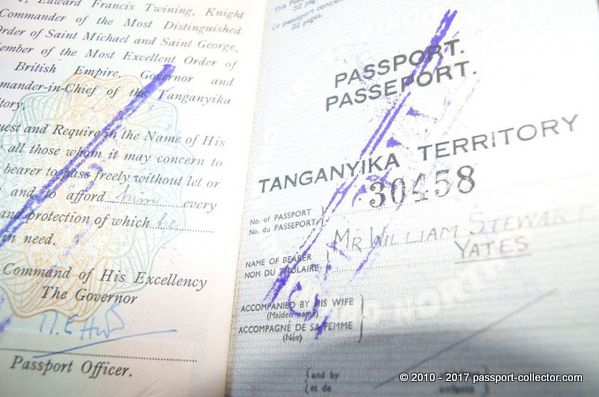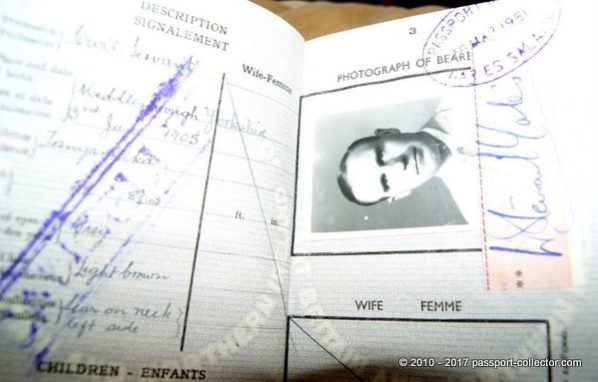British Passport – Tanganyika Territory

Tanganyika was a territory administered by the United Kingdom from 1916 until 1961. The UK initially administered the territory as an occupying power with the Royal Navy and British Indian infantry seizing the territory from the Germans in 1916. From 20 July 1922, the British administration was formalized by Tanganyika being created as a British League of Nations mandate. From 1946, it was administered by the UK as a United Nations trust territory. British Passport Tanganyika Territory
Before the end of the First World War, the territory was part of the German colony of German East Africa. After the war had broken out, the British invaded German East Africa but were unable to defeat the German Army. The German leader in the African Great Lakes, Paul Emil von Lettow-Vorbeck, called the Lion of Africa, did not surrender until his opponents notified him of the Armistice of 11 November 1918 that ended the war. After this, the League of Nations gave control of the area to the United Kingdom who named their part of the earlier German area Tanganyika. The United Kingdom held Tanganyika as a League of Nations mandate until the end of the Second World War after which it was held as a United Nations trust territory. In 1961, Tanganyika gained its independence from the United Kingdom as Tanganyika, a Commonwealth realm. It became a republic a year later but stayed in the Commonwealth of Nations. Tanganyika now forms part of the modern-day state of Tanzania.
Edward Francis Twining, Baron Twining GCMG MBE KStJ (29 June 1899 – 21 June 1967), known as Sir Edward Twining from 1949 to 1958, was a British diplomat, formerly Governor of North Borneo and Governor of Tanganyika. He was a member of the Twining tea family. In 1960 he published a book titled A History of the Crown Jewels of Europe; at over 700 pages it is probably the most extensive book on the subject. He was appointed a Knight of the Venerable Order of Saint John in 1950. He also served as Honorary Colonel to the 6th Battalion King’s African Rifles from 1955 to 1958. Now I have seen some pretty rare travel documents but this Tanganyika Territory passport is one of the rarest items a passport collector can get for his collection. To be honest, even knowing most of the British territories, Tanganyika was unknown to me till today. WOW, what a treasure! British Passport Tanganyika Territory
Sir Edward Twining was also Governor of North Borneo and also this passport type is extremely rare. Years ago I could at least get good pictures of a North Borneo document, but the owner made clear he would never depart from it, as it’s a family issue.
About the bearer of the rare passport, William Stewart Yates from Middlesbrough, Yorkshire, Civil Servant, born 1905 I couldn’t find any data.
I asked the seller if he had more background information on this rare document and he replied to me as follows.
“I quite often do house clearances and as such do sometimes find passports. This one came from a property in Portland Dorset. I understand the family had lived on the property since the 1930s. The auction houses and charity shops went in before me and I was left to clear the rubbish and clean but was surprised how much was left. I ended up with a van load of stamps/records/model railway and some other interesting bits including this passport.” British Passport Tanganyika Territory
Well, this house clearance got him quite a sum for a “paper booklet”.


FAQ Passport History
Passport collection, passport renewal, old passports for sale, vintage passport, emergency passport renewal, same day passport, passport application, pasaporte passeport паспорт 护照 パスポート جواز سفر पासपोर्ट
1. What are the earliest known examples of passports, and how have they evolved?
The word "passport" came up only in the mid 15th Century. Before that, such documents were safe conducts, recommendations or protection letters. On a practical aspect, the earliest passport I have seen was from the mid 16th Century. Read more...
2. Are there any notable historical figures or personalities whose passports are highly sought after by collectors?
Every collector is doing well to define his collection focus, and yes, there are collectors looking for Celebrity passports and travel documents of historical figures like Winston Churchill, Brothers Grimm, Johann Wolfgang von Goethe. Read more...
3. How did passport designs and security features change throughout different periods in history, and what impact did these changes have on forgery prevention?
"Passports" before the 18th Century had a pure functional character. Security features were, in the best case, a watermark and a wax seal. Forgery, back then, was not an issue like it is nowadays. Only from the 1980s on, security features became a thing. A state-of-the-art passport nowadays has dozens of security features - visible and invisible. Some are known only by the security document printer itself. Read more...
4. What are some of the rarest and most valuable historical passports that have ever been sold or auctioned?
Lou Gehrig, Victor Tsoi, Marilyn Monroe, James Joyce, and Albert Einstein when it comes to the most expensive ones. Read more...
5. How do diplomatic passports differ from regular passports, and what makes them significant to collectors?
Such documents were often held by officials in high ranks, like ambassadors, consuls or special envoys. Furthermore, these travel documents are often frequently traveled. Hence, they hold a tapestry of stamps or visas. Partly from unusual places.
6. Can you provide insights into the stories behind specific historical passports that offer unique insights into past travel and migration trends?
A passport tells the story of its bearer and these stories can be everything - surprising, sad, vivid. Isabella Bird and her travels (1831-1904) or Mary Kingsley, a fearless Lady explorer.
7. What role did passports play during significant historical events, such as wartime travel restrictions or international treaties?
During war, a passport could have been a matter of life or death. Especially, when we are looking into WWII and the Holocaust. And yes, during that time, passports and similar documents were often forged to escape and save lives. Example...
8. How has the emergence of digital passports and biometric identification impacted the world of passport collecting?
Current modern passports having now often a sparkling, flashy design. This has mainly two reasons. 1. Improved security and 2. Displaying a countries' heritage, icons, and important figures or achievements. I can fully understand that those modern documents are wanted, especially by younger collectors.
9. Are there any specialized collections of passports, such as those from a specific country, era, or distinguished individuals?
Yes, the University of Western Sidney Library has e.g. a passport collection of the former prime minister Hon Edward Gough Whitlam and his wife Margaret. They are all diplomatic passports and I had the pleasure to apprise them. I hold e.g. a collection of almost all types of the German Empire passports (only 2 types are still missing). Also, my East German passport collection is quite extensive with pretty rare passport types.
10. Where can passport collectors find reliable resources and reputable sellers to expand their collection and learn more about passport history?
A good start is eBay, Delcampe, flea markets, garage or estate sales. The more significant travel documents you probably find at the classic auction houses. Sometimes I also offer documents from my archive/collection. See offers... As you are already here, you surely found a great source on the topic 😉
Other great sources are: Scottish Passports, The Nansen passport, The secret lives of diplomatic couriers
11. Is vintage passport collecting legal? What are the regulations and considerations collectors should know when acquiring historical passports?
First, it's important to stress that each country has its own laws when it comes to passports. Collecting old vintage passports for historical or educational reasons is safe and legal, or at least tolerated. More details on the legal aspects are here...
Does this article spark your curiosity about passport collecting and the history of passports? With this valuable information, you have a good basis to start your own passport collection.
Question? Contact me...

